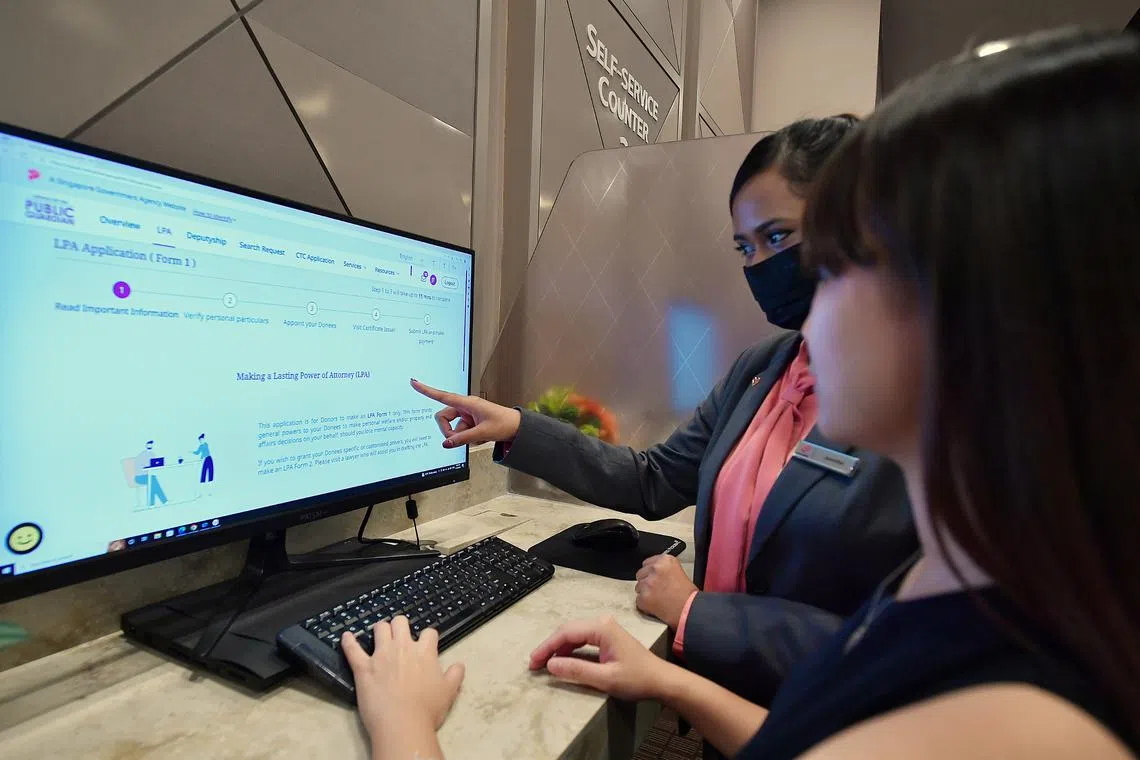Fee waiver for lasting power of attorney applications extended to end-March 2026
Sign up now: Get ST's newsletters delivered to your inbox

LPA Form 1 is for those who wish to grant donees – people who can make decisions and act on their behalf – general powers with basic restrictions.
PHOTO: ST FILE
Follow topic:
SINGAPORE - Singaporeans who wish to designate someone to make decisions on their behalf, should they lose their mental capacity, can do so for free till March 31, 2026.
The waiver of fees for lasting power of attorney (LPA) Form 1 applications – which is $75 for Singapore citizens – has been further extended to the end of March 2026, Minister for Social and Family Development Masagos Zulkifli announced in a Facebook post on Wednesday.
LPA Form 1 is for those who wish to grant donees – people who can make decisions and act on their behalf – general powers with basic restrictions.
More than 26,000 LPAs have been made online in just four months since the Office of the Public Guardian online system was launched in November 2022, said Mr Masagos.
“An LPA can go a long way in helping families fulfil the wishes and care preferences of their loved ones, and to give families peace of mind... Younger family members can also assist your elders with the application,” he said.
Senior Parliamentary Secretary for Social and Family Development Eric Chua also wrote on Facebook: “It is never too early to plan ahead and make your LPA, to ensure that people you trust can make the best decisions on your behalf if you are unable to.”
Senior Counsel Gregory Vijayendran, who is chairman of Pro Bono SG, a charity that provides legal advice and representation for the underprivileged, spoke to The Straits Times about the importance of making an LPA, especially with the higher prevalence of dementia in Singapore today.
He talked about how family members can clash over how the mentally incapacitated person’s finances and care arrangements are managed.
He has seen a case where the parents were mentally incapacitated but had moments of lucidity. The siblings fought over who would be appointed to make decisions on their parents’ behalf, in the hope of influencing them to make a will that would be to their own advantage.
“Nobody likes to talk about death. And so in executing a will, you are kind of forced to contemplate and to think about it, and it is not a very pleasant topic,” he said.
“In the same way, nobody likes to think about ‘what happens if I get dementia, what happens if I lose my mental faculties’, when things are going well for you.”
He said that even if parents have only one child whom they have a good relationship with, there is still wisdom in executing an LPA as their choices and wishes may be hard to decipher when they lose their mental capacity.
“And if you try and do a forensic exercise, reconstruct from notes they may have written and conversations they may have had, it may not always be consistent,” he added.
He likened making an LPA to getting insurance, to be able to protect oneself in the event that one loses mental capacity. “The concern, the fear is: Who can I trust? You have to apply your mind to that.”
The certificate issuer, who may be a medical practitioner accredited by the public guardian, a practising lawyer or a registered psychiatrist, ensures that there is no fraud or undue influence used to induce the donor – or the person who appoints others to make decisions on his behalf – to make the LPA.
Mr Vijayendran also suggested alternative solutions to cases of family falling-out, such as appointing two donees instead of one to provide checks and balances on each other, as well as the professional deputies and donees scheme.
Under the scheme, someone who is mentally sound can hire and appoint a person, called a professional donee, to make decisions on his behalf, should he lose his mental capacity in the future.
The professional donees, who have to be registered, may be lawyers, accountants, or healthcare or social service professionals who meet certain criteria and who pass a certification course.
As a last resort, families can pay fees to a neutral third party to make fair decisions “in order to get peace of mind and get the resolution”, said Mr Vijayendran.

